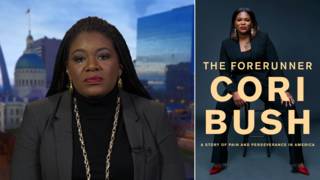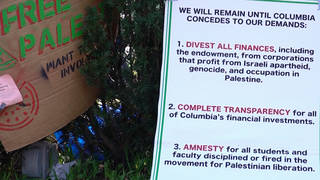
Related
During a meeting of the House Judiciary Committee on Wednesday, Democratic Congressmember Lucy McBath of Georgia shared her personal story about accessing reproductive care after experiencing a stillbirth. In doing so, she pointed out how anti-abortion politicians and legislators fail to see the medical necessity of abortion in instances such as hers. “We can be the nation that rolls back the clock, that rolls back the rights of women, and that strips them of their very liberty. Or we can be the nation of choice — the nation where every woman can make her own choice,” says McBath.
Transcript
AMY GOODMAN: Amy, I want to get your comment on a speech that was made in the House. I wanted to turn to Democratic Congressmember Lucy McBath of Georgia, who’s actually running in next week’s Georgia primary. During a meeting of the House Judiciary Committee Wednesday, she shared her personal story about accessing reproductive care.
REP. LUCY McBATH: Like so many women in America, for years, I struggled to get pregnant. My husband and I, we tried everything that we could do to start a family of our own. And finally, we were successful. I had never been so happy. And I prayed for this moment for so many years. I wanted to tell everyone. I just wanted to shout it from all of the mountaintops. For weeks I began to dream about our life and our future together. And then, one day, I woke up covered in blood.
And it’s hard to describe the agony of a miscarriage. It’s heartbreak, it’s helplessness, it’s pain, and it’s profound sadness. Millions of women suffer from them. And I’ve heard from many who felt guilty like I did, who felt as though that we weren’t worthy of having a child. Those are the same feelings that crept through my mind. And every time I’ve had these difficult discussions with other women, I remind them that they are strong and that they are powerful beyond measure, and that their worth is far more than their ability to procreate. However, it seems those in support of this ruling disagree.
After my second miscarriage, I wondered, in my grief again, if God had decided I was never meant to be a mother. So, when I finally got pregnant again, I was overjoyed. It was as if I believed that God was giving me and my husband — finally, he had a plan for us to be parents. But after four months, while feeling terror and trauma in my heart, I was rushed to the emergency room. There, with my doctor and my husband, I learned that I had suffered a fetal demise, or a stillbirth. There again, I was filled with anguish and sorrow and guilt. And I tried so hard, and still I felt like I failed trying to be a mother.
My doctor thought it would be better to — and safer to end the pregnancy naturally, without the medicines so commonly used. So, for two weeks, I carried my dead fetus and waited for me to go into labor. For two weeks, people passed me on the street, telling me how beautiful I looked, asking how far along I was, and saying that they were so excited for me and my future with my child. For two weeks, I carried a lost pregnancy and the torment that comes with it. I never went into labor on my own. When my doctor finally induced me, I faced the pain of labor without hope for a living child.
This is my story. It’s uniquely my story — and yet it’s not so unique. Millions of women in America — women in this room, women at your homes, and women you love and cherish — have suffered a miscarriage. And so I ask, on behalf of these women: After which failed pregnancy should I have been imprisoned? Would it have been after the first miscarriage, after doctors used what would be an illegal drug to abort the lost fetus? Would you have put me in jail after the second miscarriage? Perhaps that would have been the time, forced to reflect in confinement at the guilt I felt, the guilt that so many women feel after losing their pregnancies. Or would you have put me behind bars after my stillbirth, after I was forced to carry a dead fetus for weeks, after asking God if I was ever going to be able to raise a child?
And I ask because the same medicine used to treat my failed pregnancies is the same medicine states like Texas would make illegal. I ask because if Alabama makes abortion murder, does it make miscarriage manslaughter? I ask because I want to know if the next woman who has a miscarriage at three months, if she will be forced to carry her dead fetus to term.
So, for the women in your life whose stories you do not know, for the women across the country whose lives you may not understand, and for the women in America who have gone through things you simply cannot comprehend, I say to you this: Women’s rights are human rights, reproductive healthcare is healthcare, and medical decisions should be made by women and those that they trust, not politicians and officials.
We have a choice: We can be the nation that rolls back the clock, that rolls back the rights of women and that strips them of their very liberty, or we can be the nation of choice, the nation where every woman can make her own choice. Freedom is our right to choose.
AMY GOODMAN: That was Georgia Congresswoman Lucy McBath speaking on Wednesday on the House Judiciary Committee hearings on abortion access. A year after that stillbirth she described, Lucy McBath gave birth to her son Jordan Davis. In 2012, Jordan was shot dead by a white man over a dispute about loud music at a gas station in Jacksonville, Florida. Jordan was 17 years old. Before running for Congress, Lucy McBath became a leading advocate for gun control.
Still with us, Amy Littlefield, the abortion access correspondent for The Nation. I mean, this is a powerful address, real, human experience. Amy, if you can take off from there and also talk about the phone call that you were on, a number of people were on, talking about what to do with the Supreme Court?
AMY LITTLEFIELD: Oh, Amy, it’s just heartbreaking, I mean, just to think about the layers of loss that Lucy McBath has endured, losing a child who was shot to death by a white man in a parking lot because he and his friends were playing loud music, right? And her story just shows, you know, these are the women, these are the situations where people are going to die when Roe v. Wade falls. Right? We have access to safe abortion-inducing medication now. We did not before Roe v. Wade. But women in situations, and especially Black women and people of color in situations where they’re losing a pregnancy, when they show up at a hospital in a state like Oklahoma that’s going to impose a total ban on abortion, and the medical staff don’t know: Is this person sick enough? Are they dead enough for us to be able to terminate a pregnancy? Or they’re not trained on how to end that pregnancy because there’s no legal abortion in the state, and all the people who are trained on how to provide that care aren’t allowed to do that anymore. You know, I’m not sure anyone is prepared for what happens when a country that has the highest maternal mortality rate in the developed world, and a rate that’s three times higher for Black women, runs up against a system of mass criminalization that also disproportionately affects Black people, runs up against total abortion bans and the criminalization of people who help people get access to abortions, or maybe even the people themselves. Right? I mean, I’m not sure anyone is prepared for what that’s going to look like.
But I think the groups that I really turn to that are mobilizing most aggressively around this are reproductive justice groups led by Black women, led by people of color, at the state level. And I want to tell you about Michelle Colon, who is a reproductive justice leader in Mississippi, which has been at the center of the Supreme Court case. Michelle has been quoted everywhere, right? She’s out front talking at rallies, in the media, because Mississippi is at the center of the Supreme Court case. Her organization has a budget of $100,000. She hasn’t been able to leave her full-time job as a consultant, nor have her co-founders. And she is out there fighting for voting rights, thinking about infant and maternal mortality. You know, these are the underfunded organizations and the folks who are really on the frontlines.
And so, yesterday I was part of this call where a coalition of state organizations — these were actually former NARAL affiliates in the states — got together and made this big call: We need to expand the Supreme Court. And I thought it was really striking, this call to expand the Supreme Court, in coalition with some progressive members of Congress, was coming from the states, was coming from a place where abortion has already been almost restricted out of existence for so long.
AMY GOODMAN: Amy Littlefield, I want to thank you so much for being with us. This is a discussion that of course we will continue on Democracy Now! Amy is abortion access correspondent for The Nation. Her new cover story, we will link to at democracynow.org, it’s called “The Fight for Abortion After Roe Falls.”
And that does it for our show. A happy early birthday to Tey-Marie Astudillo. Democracy Now! produced with Renée Feltz, Mike Burke, Deena Guzder, Messiah Rhodes, Nermeen Shaikh, María Taracena, Tami Woronoff, Camille Baker, Charina Nadura, Sam Alcoff, Tey-Marie Astudillo, John Hamilton, Robby Karran, Hany Massoud, Mary Conlon, Juan Carlos Dávila. Our executive director, Julie Crosby. I’m Amy Goodman. Thanks for joining us.












Media Options